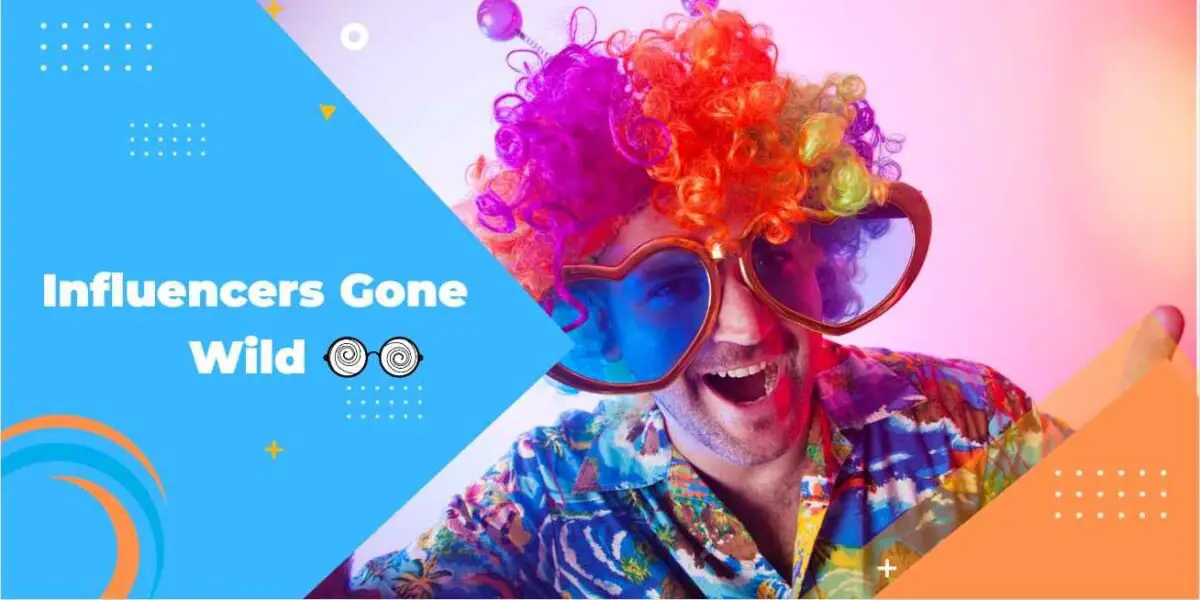Entertainment
Influencers Gone Wild: How Social Media is Changing the Way We Connect
Published
2 years agoon
By
Jack
Influencers Gone Wild: Social media has completely transformed the way we connect with others, and one of the major driving forces behind this change is the rise of social media influencers. These individuals command a massive following and have the power to shape opinions, trends, and even consumer behavior. Understanding the power of these influencers is crucial in comprehending how social media has evolved and its impact on our lives.
Table of Contents
ToggleUnderstanding the Power of Social Media Influencers
Social media influencers have become a major force in marketing and promotion. Their ability to engage with their followers on a personal level creates a sense of trust and authenticity that traditional marketing methods often lack. As a result, these influencers have gained immense influence over their followers’ purchasing decisions and lifestyle choices.
The rise of influencer culture can be attributed to the shift in consumer behavior. People now look to influencers for guidance, seeking their opinions on products, fashion, and even travel destinations. These influencers have built a relationship with their followers, who trust their recommendations and view them as experts in their respective fields.
The Rise of Influencer Culture
Influencer culture has proliferated across social media platforms. From fashion bloggers to fitness enthusiasts, influencers have found their niche and amassed a dedicated following. The aspirational lifestyle portrayed by these influencers has captivated audiences, inspiring them to chase their dreams and strive for similar success.
Furthermore, influencers have become the new role models for today’s generation. Instead of looking up to traditional celebrities, young people idolize influencers who are relatable and offer a sense of authenticity. This shift in influence has allowed social media to further shape the way we connect and form connections with others.
Let’s take a closer look at the different types of influencers that have emerged in recent years:
- Fashion Influencers: These influencers have a keen eye for style and are known for their impeccable fashion sense. They provide fashion inspiration and advice, showcasing the latest trends and must-have items.
- Beauty Influencers: Beauty influencers share their expertise in makeup, skincare, and haircare. They provide tutorials, product reviews, and recommendations, helping their followers achieve their desired looks.
- Travel Influencers: These influencers jet-set around the world, documenting their adventures and sharing travel tips. Their stunning photos and captivating stories inspire wanderlust and encourage their followers to explore new destinations.
- Fitness Influencers: Fitness influencers promote a healthy and active lifestyle. They share workout routines, nutritional tips, and motivational content, motivating their followers to prioritize their physical well-being.
The Impact of Influencers on Consumer Behavior
Influencers have a direct impact on consumer behavior, influencing trends and shaping purchasing decisions. They often partner with brands to promote their products, and their endorsement carries significant weight. Studies have shown that consumers are more likely to trust the recommendation of an influencer than a traditional celebrity or advertisement.
Moreover, influencers have the ability to create a sense of urgency and exclusivity with limited edition collaborations or discount codes, encouraging their followers to make purchases quickly. This urgency and desire to be part of a community can lead to impulsive buying behavior and a sense of belonging among followers.
It’s important to note that influencers are not just marketing tools; they are individuals with their own unique stories and experiences. Many influencers use their platforms to advocate for social causes and raise awareness about important issues. They leverage their influence to make a positive impact on society, inspiring their followers to do the same.
In conclusion, social media influencers have revolutionized the way we consume and engage with content. Their ability to connect with their followers on a personal level has made them powerful marketing tools, shaping consumer behavior and influencing trends. As influencer culture continues to evolve, it will be fascinating to see how these individuals navigate their roles and make a lasting impact on society.
The Evolution of Social Media Platforms
Social media platforms have evolved from being places to connect with friends and share personal moments to powerful marketing tools for individuals and businesses. This shift has opened up new opportunities for influencers to monetize their influence and reach.
From Personal Sharing to Business Marketing
Originally, social media platforms were primarily used for personal sharing and connecting with others. However, as the number of users increased, brands and businesses began to recognize the potential for marketing and advertising on these platforms. This paved the way for influencers, who saw the opportunity to turn their passion and expertise into a business venture.
Today, influencers work hand in hand with brands to create content that aligns with their values and resonates with their followers. This unique collaboration has allowed businesses to reach new audiences and build brand loyalty like never before.
The Role of Algorithms in Influencer Success
Algorithms play a crucial role in determining the success of influencers. Social media platforms use algorithms to curate content that is most likely to engage users. Therefore, influencers who consistently produce high-quality content that resonates with their audience are more likely to be rewarded with greater visibility and reach.
However, this reliance on algorithms has also raised concerns about content authenticity. Some influencers have been accused of using dishonest tactics, such as buying followers or engagement, to artificially boost their popularity. As a result, platforms are continually updating their algorithms to prevent manipulation and ensure that authentic content receives the visibility it deserves.
The Psychological Aspects of Social Media Connection
While social media has provided us with unprecedented opportunities to connect with others, it has also given rise to certain psychological phenomena that shape our behavior and emotions online. Two prominent examples of this are FOMO (Fear of Missing Out) and the gratification we derive from likes, shares, and comments.
The FOMO Phenomenon
FOMO refers to the anxiety or uneasiness that arises from the fear of missing out on exciting experiences or opportunities that others seem to be enjoying. Social media exacerbates this phenomenon by constantly displaying others’ highlights and achievements, which can lead to feelings of inadequacy or dissatisfaction with our own lives.
Influencers, with their aspirational lifestyles, contribute to the FOMO phenomenon by showcasing extravagant vacations, luxurious possessions, and perfect bodies. While this can inspire and motivate, it can also lead to unrealistic expectations and a negative impact on mental well-being.
The Gratification of Likes, Shares, and Comments
Social media platforms have introduced a new form of social validation through likes, shares, and comments. Every notification brings a sense of satisfaction and boosts our self-esteem. This instant gratification encourages us to seek constant validation through our online presence.
Influencers, with their large followings, often receive a high volume of engagement. Their content generates countless likes, comments, and shares, perpetuating the idea that popularity and success are tied to online metrics. This desire for validation can lead to addictive behavior and a blurred line between self-worth and online popularity.
The Ethical Implications of Influencer Culture
The rise of influencer culture has posed ethical challenges that need to be addressed. The authenticity and transparency of influencers’ content and brand partnerships have become subjects of intense scrutiny.
The Debate Over Authenticity and Transparency
One of the main concerns surrounding influencers is their authenticity. Some influencers have faced backlash for promoting products they do not truly use or believe in. This lack of authenticity undermines the trust between influencers and their followers, calling into question the integrity of their endorsements.
Transparency is also crucial in influencer-brand partnerships. Disclosing sponsored content and clearly distinguishing between advertisements and personal recommendations is essential to maintain the trust and credibility of influencers. Platforms and governing bodies have implemented guidelines and regulations to ensure that influencers are transparent about their partnerships.
The Dangers of Unrealistic Lifestyle Portrayals
The picture-perfect lives portrayed by influencers can be detrimental to their followers’ self-esteem and mental health. Unrealistic beauty standards, lavish lifestyles, and constant comparison can breed feelings of inadequacy and dissatisfaction with one’s own life.
To combat this issue, influencers are starting to embrace body positivity, authenticity, and inclusivity in their content. This shift towards more realistic portrayals of life can have a positive impact on followers’ mental well-being and create a healthier online environment.
The Future of Social Media and Influencer Culture
As the influence of social media continues to grow, and technology advances, the future of influencer culture is set to evolve further. Several trends have emerged, highlighting the potential for positive change in how we connect online.
Predicted Trends in the Influencer Space
The influencer space is expected to become more diverse and inclusive. Brands and audiences are recognizing the importance of representation, and influencers from different backgrounds and perspectives are gaining recognition.
Moreover, niche influencers are rising in popularity, catering to specific interests and communities. These micro-influencers have a dedicated following, and their recommendations hold significant weight within their niches.
The Potential for Positive Change in Social Media Connections
Social media platforms and influencers have the potential to drive positive change and make a meaningful impact. They can raise awareness and ignite conversations about important social issues, leading to positive societal transformations.
Additionally, influencers have an opportunity to use their influence to promote mental health, body positivity, and environmental sustainability. By embracing these causes and fostering a sense of social responsibility, influencers can contribute to creating a more inclusive and mindful online space.
In conclusion, social media influencers have fundamentally changed the way we connect and interact with others. Their power to shape opinions, influence consumer behavior, and inspire millions of followers has reshaped the marketing landscape and the way we perceive social media. However, with this power comes ethical responsibilities, including authenticity, transparency, and promoting a healthy online environment. As we look towards the future, the potential for positive change through influencer culture is immense, and social media connections will continue to evolve in ways we may not yet fully comprehend.
Author

